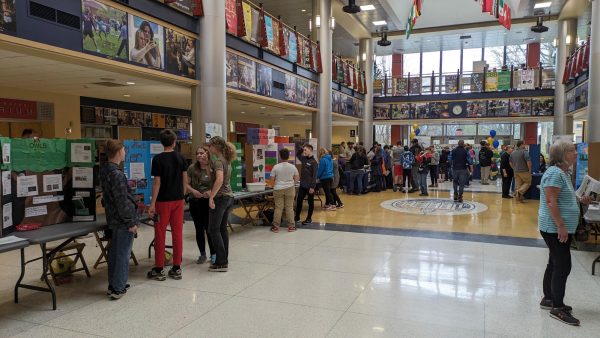Confusion mounts over module 1
Some students, faculty concerned about ACHA policies amidst omicron
Nearly two years to the day after the first case of COVID-19 was reported in the United States, Allegheny College welcomed students back on campus for module one classes. For the second year in a row, the college separated the spring semester into two modules. Student reactions to the modified academic schedule this year were mixed.
Nahayan Minhas, ’24, who took a module one class last year said that while he was having a better experience this semester, he was disappointed with the college’s overall COVID-19 response.
“With almost a million new COVID cases every day, one would hope that they would care about keeping the spread down,” Minhas said. “Instead, there’s only a mask mandate that I haven’t even seen being enforced properly, it’s like there seems to be no regard for the health and safety of disabled and immunocompromised students.”
Minhas is also skeptical of the college’s reasoning for even having module one in the first place.
“It’s like last year it made sense because it was all remote, so that stops the spread of COVID, but it’s in person this year so what even is the point?” Minhas said.
Some students see an on-campus module one as a way for the college to make money, since no students on campus means that the college would not generate revenue from room and board fees.
“I think we’ve already seen from the administration’s actions in recent months that they only care about profits and spending on projects that cater to themselves, rather than looking after the needs of the students and staff,” Minhas said.
Guillame Loinard, ’24, disagreed with Minhas’ sentiment to an extent.
“I don’t necessarily think that’s the reason, it might be a factor, but I don’t think it’s the whole thing,” Loinard said. “What I’m more worried about is the fact that the college markets themselves as environmentally-conscious and friendly but when given a pretty good reason to cut power usage and food waste and stuff like that they don’t.”
Loinard added that module one provides a heavy course load.
“In my opinion, it’s pretty tough to do a whole course in three weeks, especially when it’s three hours a day with homework every day,” Loinard said. “I mean personally, I’ve been lucky, the amount of work hasn’t been overwhelming, but it’s still pretty hard to schedule stuff, and like if you have sports or clubs that’s another thing, so it’s just a lot for no reason.”
Katie Perez, ’24, said that while she likes the content of her module one class this year more than last year, she suffered the same stresses of a compressed course.
Perez was not in favor of module 1 being in person.
“Mod one was supposed to be online,” Perez said. “While, yes, being in a classroom is the best way to learn, it loses its effect when you are in the class for an extended amount of time and are expected to pay attention the whole time. It also feels like everything is really rushed because of the limited time we have in class together.”
Perez is of the opinion that since module 1 is in person that the three hour long classes are unnecessary. Instead, Perez proposed that the three hours be divided into two or three separate timeblocks in order to be closer to a normal semester as well as not overwhelm students and faculty all at once with three hour long classes, citing the exhaustion that she felt with the module one classes both last year and this year.
“I feel I lose the ability to focus when I reach the two hour mark. It also feels like everything is really rushed because of the limited time we have [in the module],” Perez said.

Mo is a sophomore from Columbus, Ohio. He is majoring in English and possibly minoring in JPI and/or Political Science. He is the Features Editor and this...






